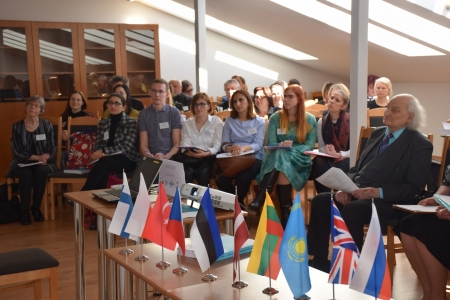Researchers from ten countries discuss about the future of the education
On the 12th and 13th of May 10 International Scientific Conference "Rural Environment. Education. Personality” , took place at LLU Technical Faculty (TF) in which participants from ten different countries presented their reports.
The aim of the conference was to find solutions, share ideas and highlight current issues and trends in schools, universities and adult education in relation to the competencies in education, quality of life at home environment, career and professional. This year conference was attended by 138 writers from 10 countries: the United Kingdom, Latvia, Czech Republic, Estonia, Lithuania, Kazakhstan, Russia, Poland, Finland, Turkey.
At Plenary the audience was welcomed by the Director of Education and Home Economics Institute, Professor Baiba Briede. Reports on various topics were provided by colleagues from Latvia and other countries. Colleague from Latvian University Aleksandrs Vorobjovs presented the paper on “Factors influencing mathematical competence among adolescents”, University of Helsinki Professor Kaija Turkki presented report " Global competence - a challenge for home economics - human ecology ", Czech Life Sciences University, Education and Communication Institute Professor Karel Němejcs with report “Students' successes and challenges in university education ", Russian Plekhanovas University of Economics Professor Katerina Stepanenko and Liya Torosyan report " Individual learning combinatorial modeling in modern learning sphere " and Liepaja University lecturer Inga Laizānes report “Latvian language as a foreign language learning development and perspectives in Latvia”.
As reported by the representatives of Conference Organizing Committee after the plenary session work continued in four thematic groups “Problems and solutions for schools, universities and adult education nowadays”, “Competence in Education”, “Quality of life in the context of home environment”, “Development of professional and career education”, in which 61 report was read.
In section “Problems and solutions for schools, universities and adult education nowadays” were reviewed most recent studies which has some connection with modern education, its problems, solutions and problem-solving methods of child and adult education, as well as the such important topics like philology, sociology, psychology, engineering and mathematics were discussed. Section was divided into three subsections in which one of the topics was education in schools and higher education institutions. Such issues as the reform of the educational process, the creative school culture in the Baltic States, teachers' training styles etc . In the context of higher education it was also discussed on lifelong learning and students' opinions on a variety of topics, as well as compared the Latvian and Norwegian students' experience. In the second section themes of mathematics, engineering sciences and information technology were discussed. Mostly it was discussed about how computer technology can improve the study process. The other topics were gathered in the third subsection, where it was discussed about the latest discoveries in the field of philology, sociology, psychology and other areas. There was also a discussion about the development of speech and language training technology upgradeability, attitudes towards violence research methods, human resources evaluation process optimization.
At the conference section on “Competence in Education” were highlighted questions about the potential of higher education to promote the understanding and implementation of goals and tasks the. The importance if mathematical competence among youngsters was noted, to fully meet the requirements of the knowledge in society, and discussions on the appropriate teaching methods. In the section they also discussed the issues on cooperation skills of students and intercultural competence development at universities, using music and other cultural activities. Polish colleagues raised the issue of the relationship between farmers' level of education/lifelong learning and their farm management efficiency. The parties also discussed the problem of the required competence for safety professionals. Also, in the section the great Latvian teacher Ata Kronvalda 180-year commemoration of his outstanding and diverse pedagogical legacy of schools and adult pedagogy was worshiped.
At the “Quality of life in the context of home environment” the methodology of home economics subject was discussed both in historical cross-section as well as the by upgrading today's information technology. They discussed the name change of home economics subject in Estonia, teachers' understanding of ICT role, do teaching materials meet the modern high-tech educational requirements and teachers education in Estonia. Students' independent thinking aspects at home economics lessons. The training of new home economics teachers and study programs Analysis Lithuanian, Finnish and English universities. We analyzed the competence-based educational concept that is based on today's education system reform in Latvia.
The presented and discussed research at the work section “Development of professional and career education” can be divided into two interrelated groups: research in which the author devoted more attention to key competencies, the improvement career management skills in formal and non-formal education learners (students, long-term social beneficiaries) groups, and studies that focus on career guidance resources (eg., dialogue methods, target setting tasks, volunteering opportunities, the State employment Agency provided guidance services, etc.) use and development. Interest led to a report on career management skills development foot specialist study programs in Latvia and abroad. Sections participants also discussed cross-border career (career, in which part of the work and life experience is obtained abroad) the advantages and disadvantages and discussed the necessary state and employer support for career development.
The conference was organized by LLU Faculty of Engineering institute of Education and Home Economics.
